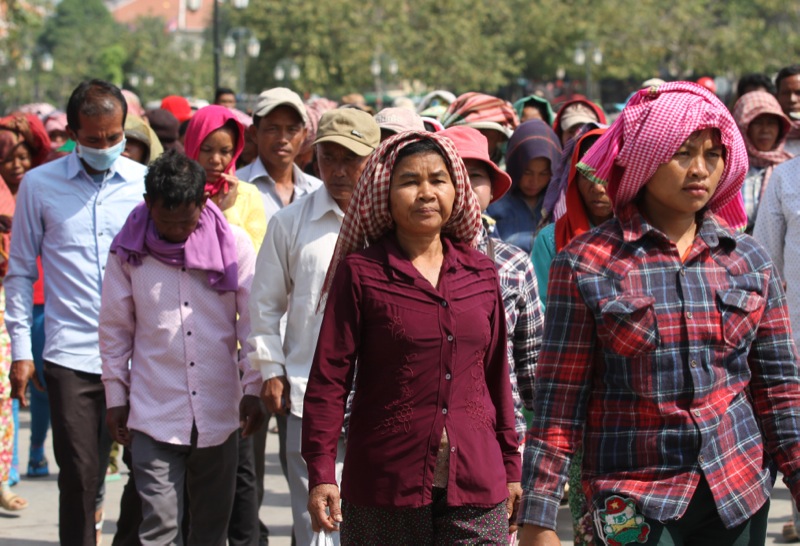Three years after starting work on a comprehensive compensation plan for thousands of families that accuse sugarcane plantation owners of stealing their land, the E.U. is urging the government to use independent experts to audit their claims in the face of persistent resistance from the prime minister.
Hundreds of families from across four provinces journeyed to Phnom Penh last week with a petition urging Prime Minister Hun Sen to sign off on a plan—or terms of reference—for reviewing their claims. Exactly three years earlier, the government had agreed to start negotiating those terms with the E.U., which imports some of the country’s sugar, to ensure the claims were audited fairly and independently.

Since receiving the petition, however, the prime minister’s cabinet has said that Mr. Hun Sen won’t be signing the terms because he wants the Land Management Ministry to review the families’ claims on its own.
Mr. Hun Sen “will not sign because he wants lower officials from the Land Management Ministry to do this job first,” Pal Chandara, who typically handles land dispute complaints for the cabinet, said last week.
Having the ministry audit the claims on its own, however, effectively defeats the very purpose of the terms, which were specifically meant to ensure a transparent assessment with the help of independent experts and ongoing consultation with, and input from, NGOs and the families themselves.
Asked again about the prime minister’s reasons for rejecting the terms this week, Mr. Chandara insisted that the government’s own people were best suited for the job.
“We have already sent this to the Land Management Ministry because it has its teams working in every province. The ministry has a clear mechanism to solve this and it knows how to solve it,” he said.
The E.U. says the government has been sitting on the terms since October 2015.
Asked for comment on Mr. Chandara’s recent remarks, E.U. Ambassador George Edgar said the terms remained the best way forward.
“We have made clear to the Royal Government of Cambodia our view that an assessment of the claims related to sugarcane [plantations] which has the confidence of all stakeholders through the involvement of independent experts is the best way to reach a final resolution of the continuing community claims,” he said. “We are awaiting a decision by the Royal Government on this matter.”
Even using the terms, a final resolution for the families would probably still be years off.
Am Sokha, a case coordinator for the Community Legal Education Center, a local NGO that has advocated on behalf of the families, said Mr. Hun Sen may be looking for a quick fix to the disputes to bolster his image on the campaign trail for this year’s commune elections or the national poll next year.
But a fair and lasting resolution would need the continued involvement of the E.U., as the terms of reference require, he said
“If he ignores or refuses to sign, he seems not to want to help the people,” Mr. Sokha said.
“They should cooperate with the E.U. because…they can conduct fact-finding and find what the communities need to solve the issue,” he added. “They have the expertise or skills to do it.”
The disputes have been festering for years, driving many families out of their homes—sometimes violently—and often into crippling debt. The families have repeatedly turned to a long list of government agencies for help, but to little avail.
Tired of waiting on the government for a solution, they teamed up with a group of NGOs in 2012 for a campaign urging companies and consumers abroad to stop buying Cambodia’s “blood sugar.” They also tried persuading the E.U. to end the duty-free access it grants Cambodia’s sugar imports, which they argued was effectively subsidizing the owners of the plantations evicting them, including CPP Senator Ly Yong Phat.
The E.U. refused. Instead, it persuaded the government in February 2014 to start work on what was to be a comprehensive compensation plan for the families. The terms of reference Mr. Hun Sen is now refusing to sign was the product of their collaboration.
The E.U.’s sugar imports from Cambodia have plummeted in the meantime, from a peak of 64,800 tons in 2013—worth $40.5 million—to 38,000 tons in 2014, and 3,400 tons the year after that. The bloc imported about 3,800 tons worth $2.2 million during the first 10 months of last year, according to the latest figures available.
Despite the dropoff in exports to Europe, most of Cambodia’s sugarcane plantations continue to operate, making the occasional, piecemeal compensation deal with some of the families. But the vast majority of families have yet to win back their land, or anything close to the compensation they believe they deserve.
Huoy Mai, who lost her home and farm to a plantation in Oddar Meanchey province, said the prime minister’s refusal to sign off on the terms of reference that the E.U. helped craft left her with little hope of a fair resolution.
“If the terms are not signed, the disputes cannot be solved and we will remain day laborers,” she said yesterday. “If the petition is sent to the Land Management Ministry, we have no hope at all.”